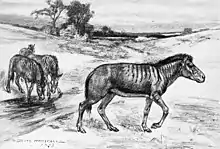| Juchipila Formation | |
|---|---|
| Stratigraphic range: Neogene | |
| Type | Formation |
| Location | |
| Coordinates | 21.7° N, 102.8° W[1] |
| Country | Mexico |
The Juchipila Formation is a geologic formation in Mexico. It preserves fossils dating back to the Neogene period.[2] Closely corresponding to the other Hemphillian faunal assemblages of North America, it is significant for understanding the palaeofauna of Miocene and Pliocene central Mexico.[2]
Paleoenvironment
The paleoenvironment of the Juchipila Formation was largely terrestrial in nature.[2] The El Mixton locality consists of a shallow lacustrine succession, beginning near the bottom of an arroyo. Ostracods and gastropods are abundant in these deposits.[2] A thin bed of unconsolidated white ash-fall material, consisting of felsic glass shards and small, overlies the shallow lacustrine succession of the El Mixton locality. In this part of the succession, camelid and proboscidian footprints are known.[2] The loose paleosols of the El Mixton contain mammal fossils, including the canid Borophagus and the equid Dinohippus. The terrestrial Puente de Cofradía locality bears fossils of Calippus and Cosoryx. The volcaniclastic sandstone of the El Resbalón bears indeterminate megalonychids and antilocaprids.[1]
Paleobiota
The Juchipila Formation has yielded a rich variety of extinct mammals.[2]
Mammals
| Genus | Species | Notes | Images |
|---|---|---|---|
| Alforjas[1] | A. taylori | A camelid | |
| Astrohippus[1] | A. ansae | ||
| Antilocapridae indet.[1] | Genus and species indeterminate. | A pronghorn. | |
| Borophagus[3] | B. secundus | Originally Osteoborus secundus |  |
| Calippus[3] | C. hondurensis | Originally Calippus (Grammohippus) hondurensis | |
| cf. Cosoryx sp.[4] | Species indeterminate | An antilocaprid | |
| Dinohippus[3] | D. mexicanus |  | |
| Machairodontinae indet.[3] | Genus and species indeterminate | ||
| Megalonychidae indet.[3] | Genus and species indeterminate | ||
| Neohipparion[3] | N. eurystyle |  Restoration of N. affine | |
| Rhinocerotidae indet.[3] | Genus and species indeterminate | ||
| Plioceros sp.[3] | Species indeterminate | An antilocaprid | |
| Tayassuidae indet.[3] | Genus and species indeterminate | A peccary. | |
See also
References
- 1 2 3 4 5 Fossilworks: El Resbalón. Fossilworks.org. Retrieved 2021-03-31.
- 1 2 3 4 5 6 O. Carranza-Castaneda, J. J. Aranda-Gómez, X. Wang and A. Iriondo. 2013. The Early-Late Hemphillian (Hh2) Faunal Assemblage From Juchipila Basin, State of Zacatecas, Mexico, and Its Biochronologic Correlation with Other Hemphillian Faunas in Central Mexico. Contributions to Science, Natural History Museum of Los Angeles County 521:13-49
- 1 2 3 4 5 6 7 8 9 Fossilworks: El Mixtón. Fossilworks.org. Retrieved 2021-03-31.
- ↑ Fossilworks: Puente de Cofradía. Fossilworks.org. Retrieved 2021-03-31.
External links
- Various Contributors to the Paleobiology Database. "Fossilworks: Gateway to the Paleobiology Database". Retrieved 17 December 2021.